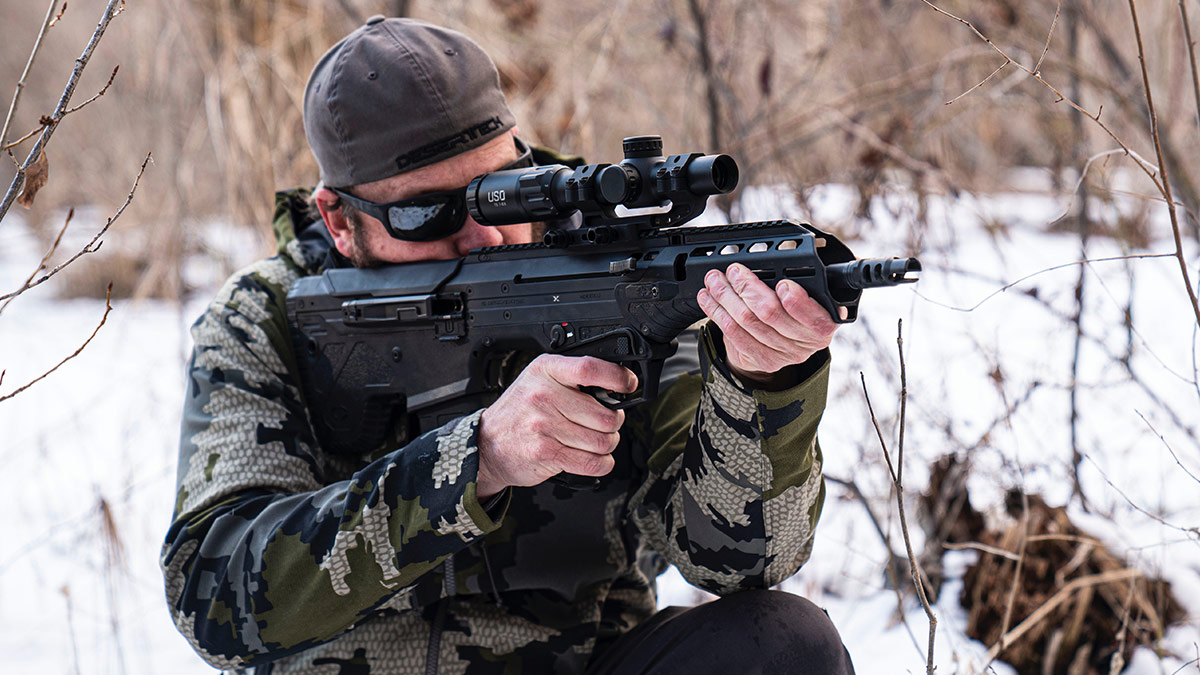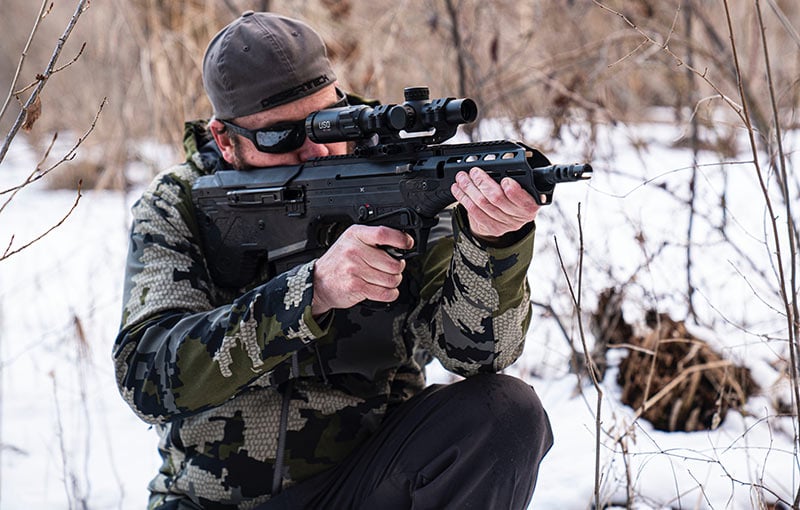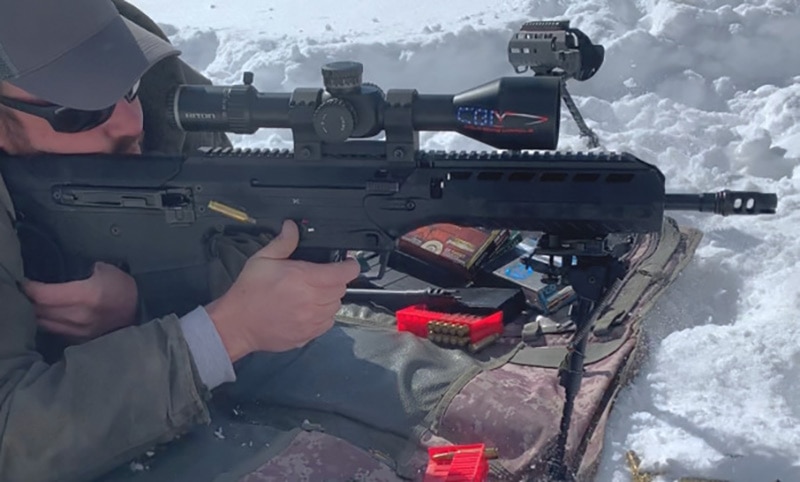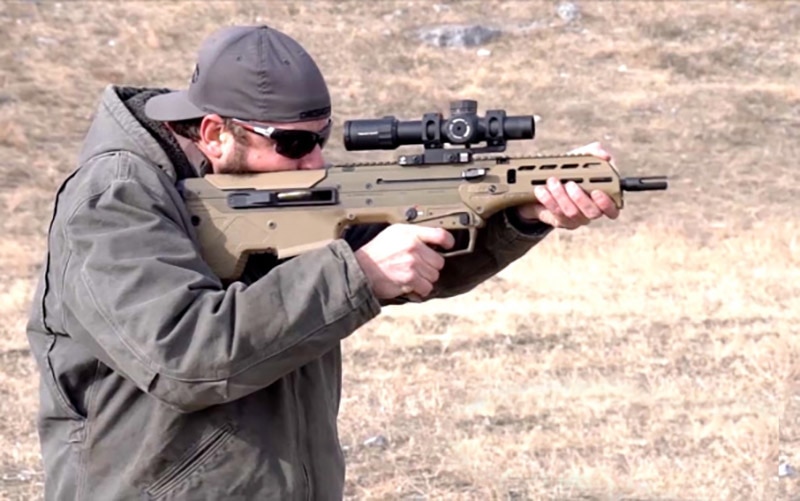Desert Tech has pushed technology limits since its inception in 2007, and this year it released another product, the MDRX, that follows the Desert Tech adage “Tomorrow’s Weapons.”
The MDRX is the next generation rifle from Desert Tech, building on the already popular MDR rifle released in 2016. The MDRX is a short-stroke piston operated semi-automatic bullpup — a rifle configured such that the action, magazine, and firing mechanics are all located behind the trigger. The purpose of this design gives the MDRX a shorter overall length than conventional rifles of the same barrel length.
Features
All Desert Tech rifles are designed with modularity in mind, and as such, they are all available as multi-caliber chassis and barrel combinations. The MDRX shares that same heritage, available in four different calibers from the factory — .223 Wylde, .308 Win, .300 BLK, and 6.5 Creedmoor. All four of these barrel conversion kits are interchangeable in the same chassis, making the MDRX one of the few modern sporting rifles that accepts both large and small frame calibers.
The various caliber conversions for the MDRX feature popular twist rates, and standard barrel thread for adding muzzle accouterments. There are also both 16-inch and 20-inch barrels available in several of the assorted calibers, giving shooters different performance options. The MDRX comes standard with a Desert Tech Ratchet compensator. Compensators are caliber specific to provide the best performance in recoil reduction and prevent muzzle rise.
An ambidextrous setup, MDRX controls are mirrored on both sides of the rifle for both right and left-handed shooters. The ambidextrous charging handles of the MDRX are non-reciprocating, normally locked to the front in a spring-loaded detent. They can also be locked to the rear by pulling them back and up, the release is as simple as slapping either of the handles down allowing the bolt carrier to close into battery. The gun locks open upon firing the last shot from the magazine and the bolt release is centrally located right behind the magwell for quick reloads.
In addition to ambi controls, the rifle offers a forward ejecting system that sends spent brass forward and away from the shooter. If you are a dedicated left-hand shooter, you can swap ejection from forward right to forward left in just a few seconds, keeping hot brass away from the face.
The forward ejection system is a curious feature on the MDRX platform. The open-faced bolt extracts the spent case and carries it to the rear, as the carrier travels it engages the ejector with a dovetail lug on either side. The momentum of the carrier then pulls the scissor-like ejector out and it swipes across the open bolt face pushing the spent case off and into the ejection chute opposite. There it is retained by a spring-loaded pawl until the bolt carrier again travels forward where a protruding lug pushes the spent case forward and out the ejection chute.
Though interesting, it’s not without its flaws. I found with that ejection system a firm stroke of the charging handles is required to get the cartridge seated firmly in the ejection chute. The MDRX SE, chambered in .223 Wylde, utilizes a standard side eject system for those who prefer a more traditional ejection pattern.
The MDRX has a six-position adjustable gas valve allowing the operator to tune the rifle. The aluminum/polymer chassis construction features a full-length upper Picatinny rail, M-LOK slots for accessories and flush-mounted QD sling cups on the rear of the receiver. It is also designed to accept most AR-15 style magazines, and for large frame calibers, it uses SR-25 pattern mags. The rifle ships with caliber appropriate PMAGs from Magpul. The trigger feel of the MDRX is also widely accepted as great. The common consensus being it’s a good trigger, not just for a bullpup, but a good trigger period.
On the Range
With several barrels in hand, I took the MDRX into my mountain hide to test its function. I started out shooting the 16-inch .308 Win barrel, loaded with Fiocchi 150-grain FMJ at 100-yards. I fired the rifle at several targets to see how it ran, finding the recoil to be much softer than the previous similar rifles. The trigger was clean and crisp, while the reset was audible.
I fired several additional groups using American Eagle XM80 as well as some 168-grain match ammo from both Hornady and Federal. The match-grade ammo certainly provided better groups, averaging around 1-MOA.
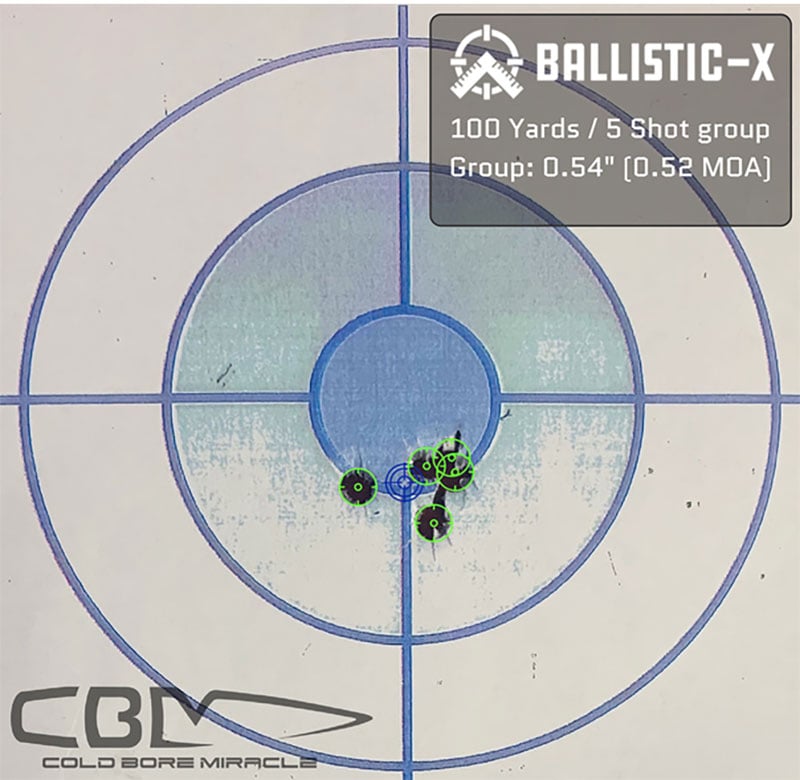
A typical 5-shot group from the .223 Wylde MDRX using 40-grain Fiocchi at 100-yards. (Photo: Jeff Wood/Guns.com)
With several hundred rounds through the rifle, I figured it was time to test the metamorphosis of this multi-caliber rifle. I removed the handguard, secured by two screws and one take-down pin, using a 5mm hex wrench. The barrel can then be released by loosening two barrel clamp screws and then disengaging the barrel lock. I swapped out the previous barrel for the 20-inch 6.5 Creedmoor, seating it firmly towards the breach. Like that, the rifle transformed from a 16-inch .308 Win into a 20-inch 6.5 Creedmoor.
The 6.5 Creedmoor shot very well with 140-grain ammunition from both Hornady and Desert Tech as well S&B 140-grain ball ammo. The groups averaged much better, in the sub to half MOA realm. With this kind of accuracy, I couldn’t wait to take the MDRX out to more significant distances. For several hours, the rifle neatly piled brass right in front of my shooting mat without a malfunction. and just kept eating magazine after magazine of ammunition.
Conclusion
A compact rifle with solid reach, the MDRX makes a great rifle, whether you’re in a tree stand or searching for a decent behind-the-seat truck gun. Thought the MDRX does bring a heftier price tag, the multicaliber option alone saves money by consolidating training. Whether it is a home defense rifle or a suppressed ranch rifle, the MDRX is a do-it-all rifle. The MDRX starts at $2,099 while it’s sibling MDRX SE is priced at $1,889.
